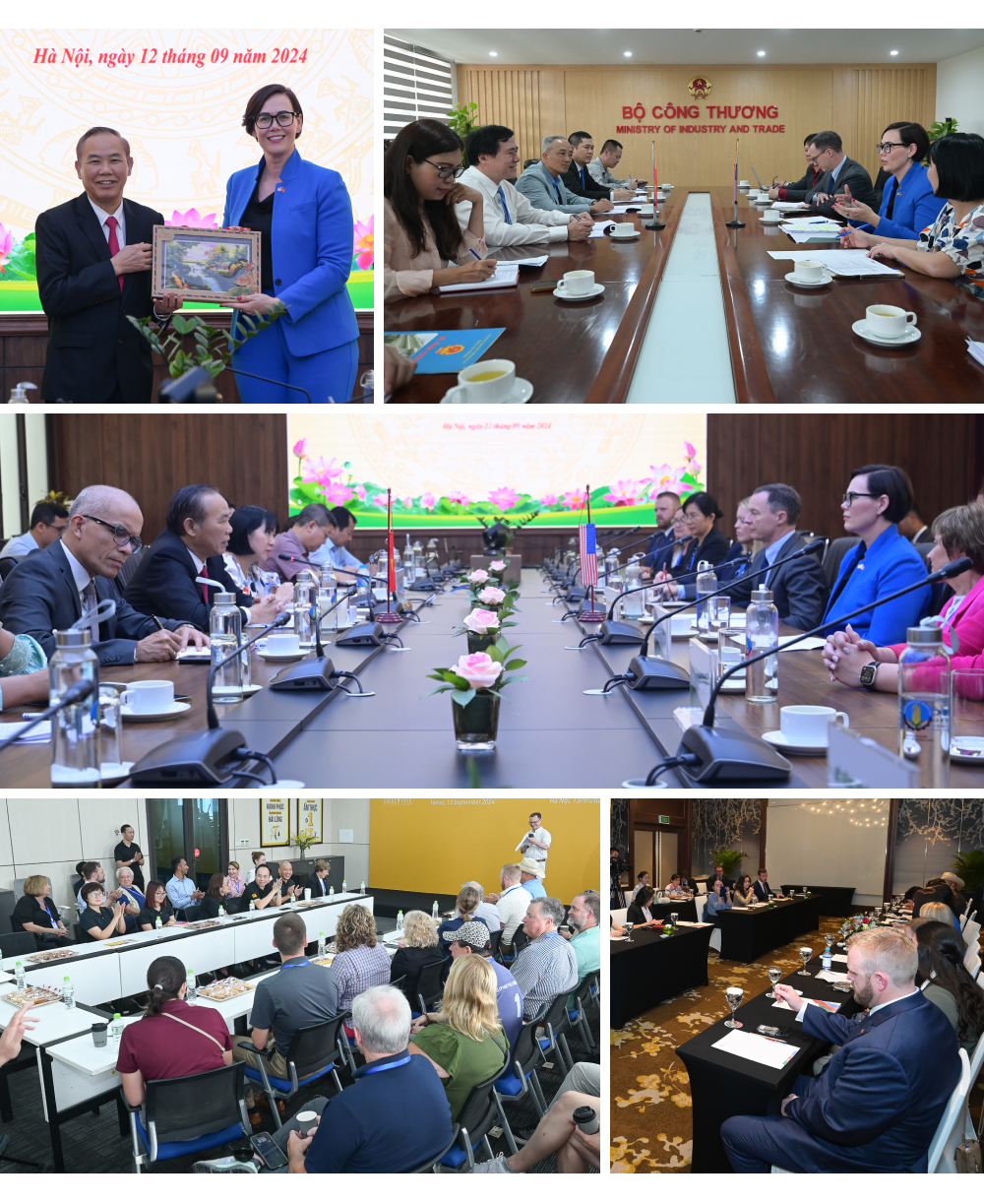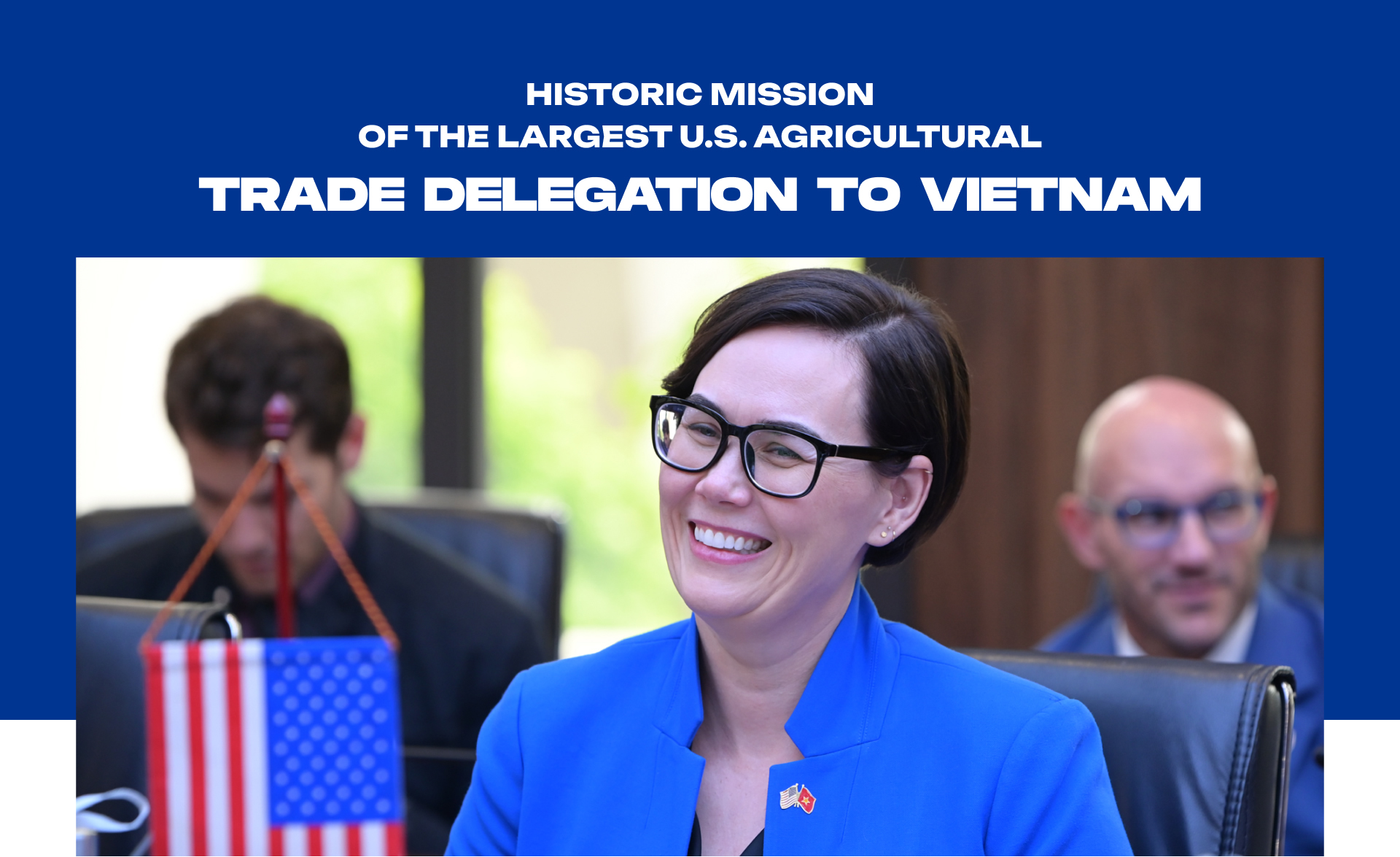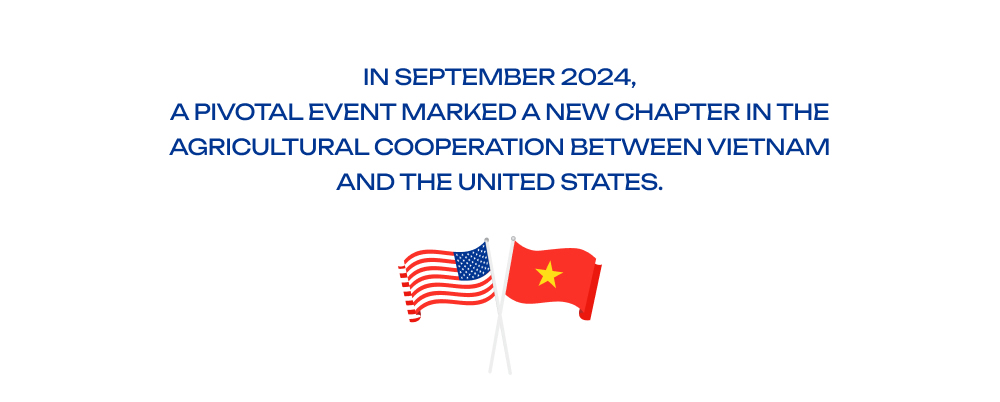
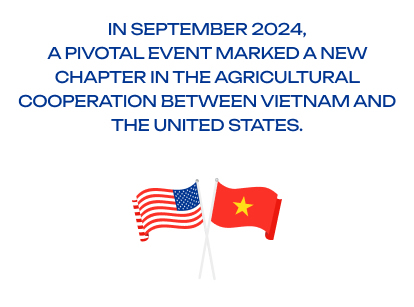
Led by Alexis Taylor, Deputy Secretary of the U.S. Department of Agriculture (USDA), the largest U.S. agricultural delegation in the history of bilateral relations visited Vietnam. The visit was part of the celebrations for the first anniversary of the Comprehensive Strategic Partnership between the two nations, underscoring the U.S.'s strong interest in the Vietnamese market. The delegation showcased the diversity and scale of American agriculture, with 9 state agricultural representatives, 35 businesses, and 25 industry associations in attendance.
With the aim of enhancing agricultural trade, U.S. representatives provided insights on expanding the presence of Vietnamese-branded products on American shelves. Additionally, state agricultural leaders shared their experiences in sustainable development and the application of science and technology in agricultural production.
On this occasion, Vietnam Agriculture Newspaper conducted interviews with several state agricultural leaders to explore market access opportunities for wood, fruit, and beef products between businesses in both countries.


Mr. Andy Holt, Assistant Commissioner for Business Development at the Tennessee Department of Agriculture, shared that this trip marked his third visit to Vietnam. On his first trip, he explored the local wood market and was immediately impressed by the country’s thriving furniture manufacturing industry, quickly recognizing Vietnam as a potential market.
“I was aware of Vietnam’s strong furniture industry, second only to China in scale. But witnessing it firsthand, I was struck by the abundance of skilled labor, advanced production infrastructure, and high level of expertise,” Mr. Holt remarked.

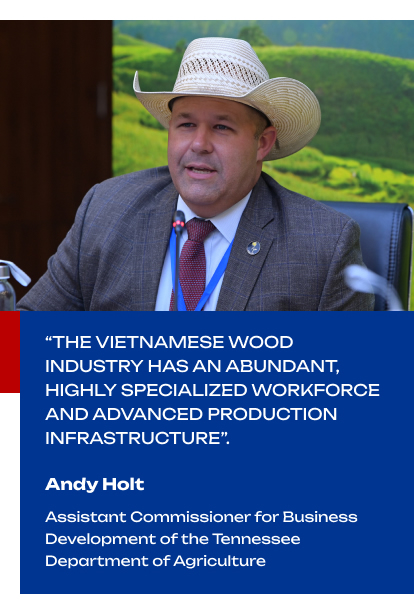
With a deeper understanding of Vietnam's wood industry, he offered advice to local wood businesses seeking to export to the United States.
First, the Tennessee representative emphasized the complementary nature of the two countries’ wood industries. Given the U.S.'s strength in providing high-quality raw timber, Vietnamese furniture and handicraft manufacturers can directly source materials from the United States.
He also highlighted the U.S.'s commitment to responsible timber sourcing. Tennessee, with 54% forest cover, is proud to be a globally recognized supplier of wood. In addition to ensuring that all timber is legally harvested, forest owners in Tennessee commit to replanting an average of 1.6 trees for every tree cut down.
Vietnam’s strategy of sourcing wood from various countries, including the U.S., is a smart move. “The Vietnamese wood industry excels in manufacturing and finishing products, making it ideal to import raw materials, produce finished goods, and then re-export them to the U.S. and other global markets,” Holt explained.
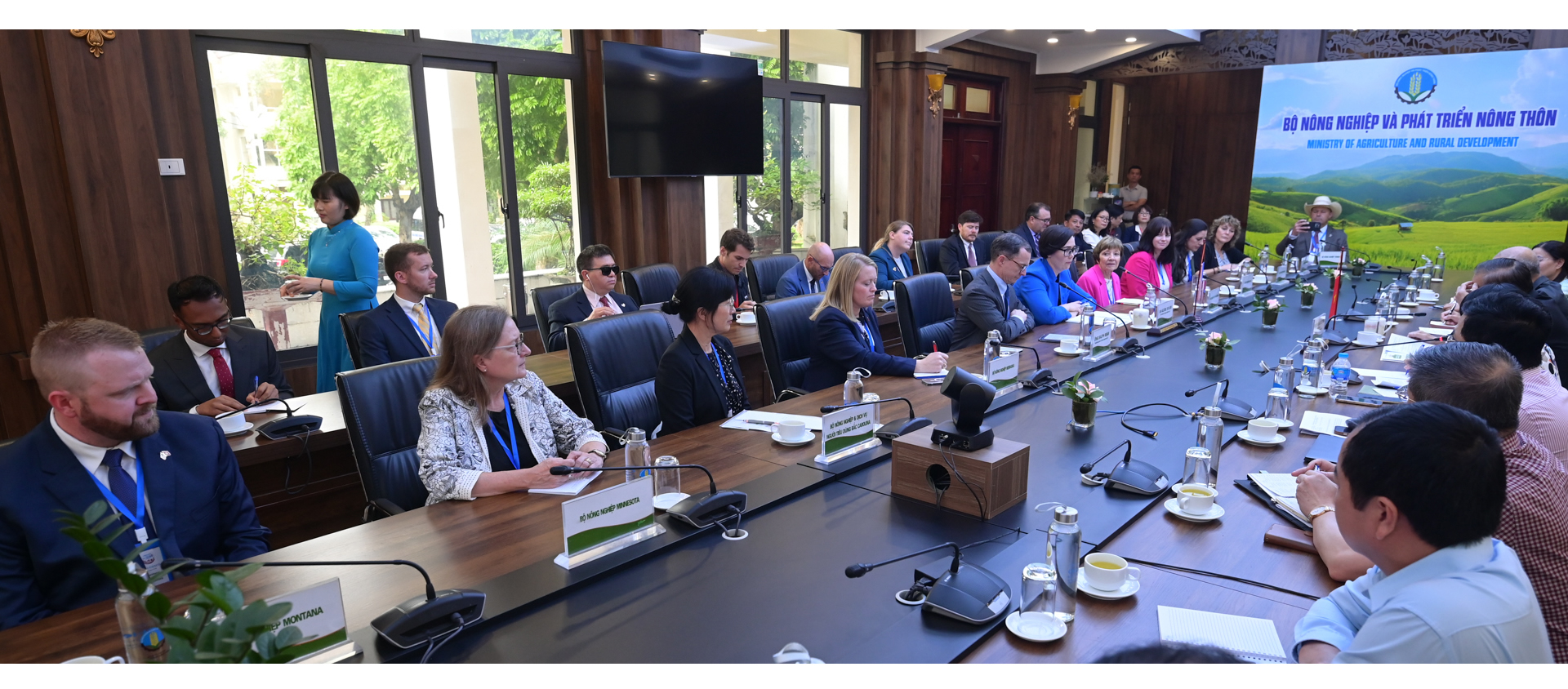
One of the key strengths of the U.S. wood industry is the National Hardwood Lumber Association (NHLA) hardwood grading system. This system classifies lumber quality into five grades, from FAS (first and second Grade) to common grades (No. 1, No. 2AC, No. 2AB). Vietnamese manufacturers can select the type of raw material that best suits their production needs and budget.
Selecting the right raw material allows domestic manufacturers to process the wood according to their specifications. For instance, if a furniture producer requires high-quality, uniform wood, they can opt for FAS-grade lumber. On the other hand, if they need wood that will be covered with other materials, where appearance is less critical, they can choose lower-grade wood at a more affordable price.
“The primary goal of the U.S. wood industry is to support international partners, including Vietnam, by providing sustainable, high-quality wood products that meet the diverse needs of manufacturers in terms of quality and cost,” Holt affirmed.


Karen Ross, Secretary of the California Department of Food and Agriculture (CDFA), highlighted the diversity within the state’s agricultural community. California boasts a vibrant Asian farming sector, specializing in the cultivation of Asian herbs and fresh berries.
There is a significant demand for Asian products in the state, particularly in San Francisco. Secretary Ross stated, “Many Californians love Vietnamese cuisine. They not only enjoy dining out but also relish cooking at home. It’s wonderful to have easy access to authentic ingredients at farmers' markets and local grocery stores.”
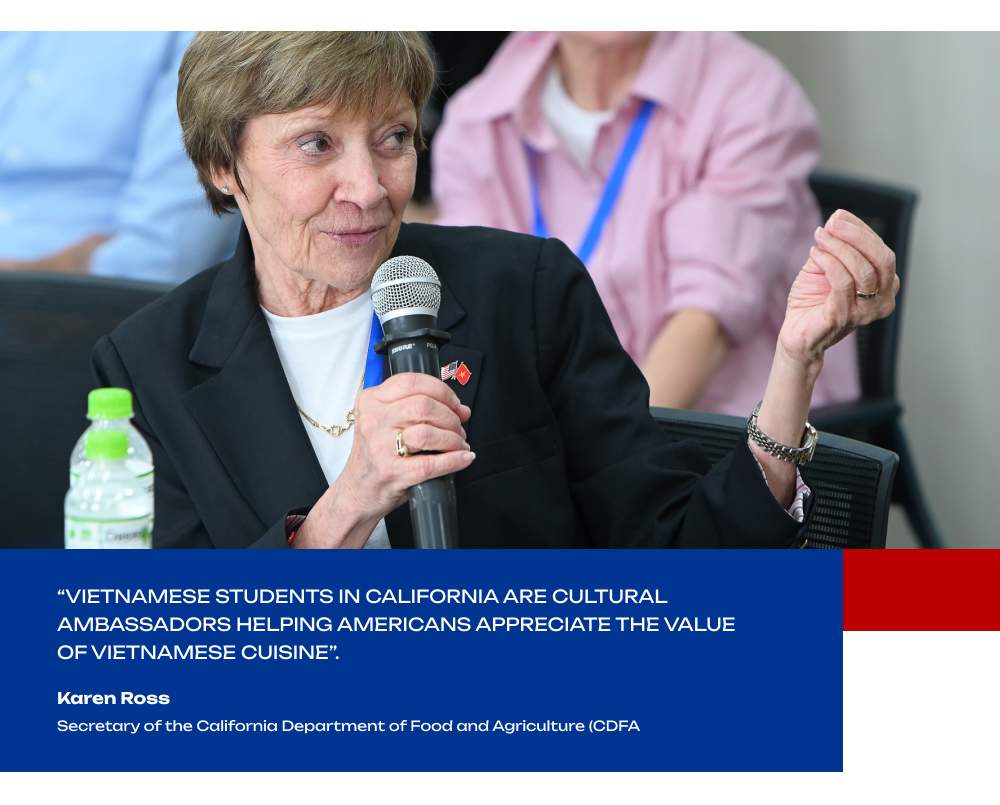
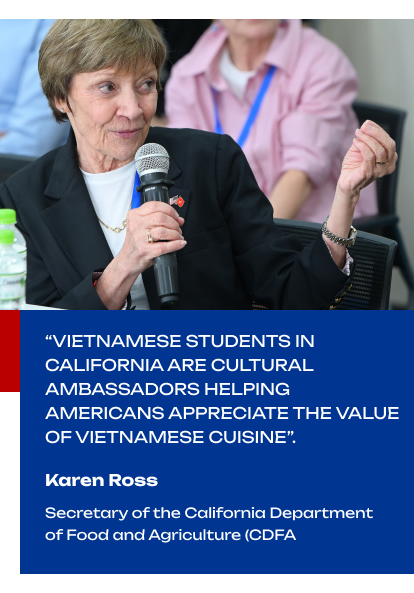
Dragon fruit has gained increasing popularity in California. When dragon fruit first hit supermarket shelves, many consumers were indifferent to it. However, its sweet and refreshing flavor has since captured many hearts. The demand for dragon fruit surged, particularly as the COVID-19 pandemic disrupted supply chains.
Through her collaboration with the Vietnam Ministry of Agriculture and Rural Development (MARD), Secretary Ross noted that the Vietnamese Government prioritizes expanding the market for tropical fruits such as passion fruit, guava, and jackfruit. She recommends that Vietnam develop a specific strategy to penetrate this promising Asian American market.
“Vietnam’s tropical fruits may be unfamiliar to U.S. consumers. Therefore, your agencies and businesses need to be patient and adopt a methodical approach. To ensure your products are well-received, allow consumers to experience these fruits in the same way that Vietnamese people enjoy tropical flavors,” Secretary Ross advised.
A particularly interesting aspect of California is the role of Vietnamese and Southeast Asian students in building cultural and academic bridges. Many Vietnamese students studying in California serve as cultural ambassadors for Vietnamese cuisine.
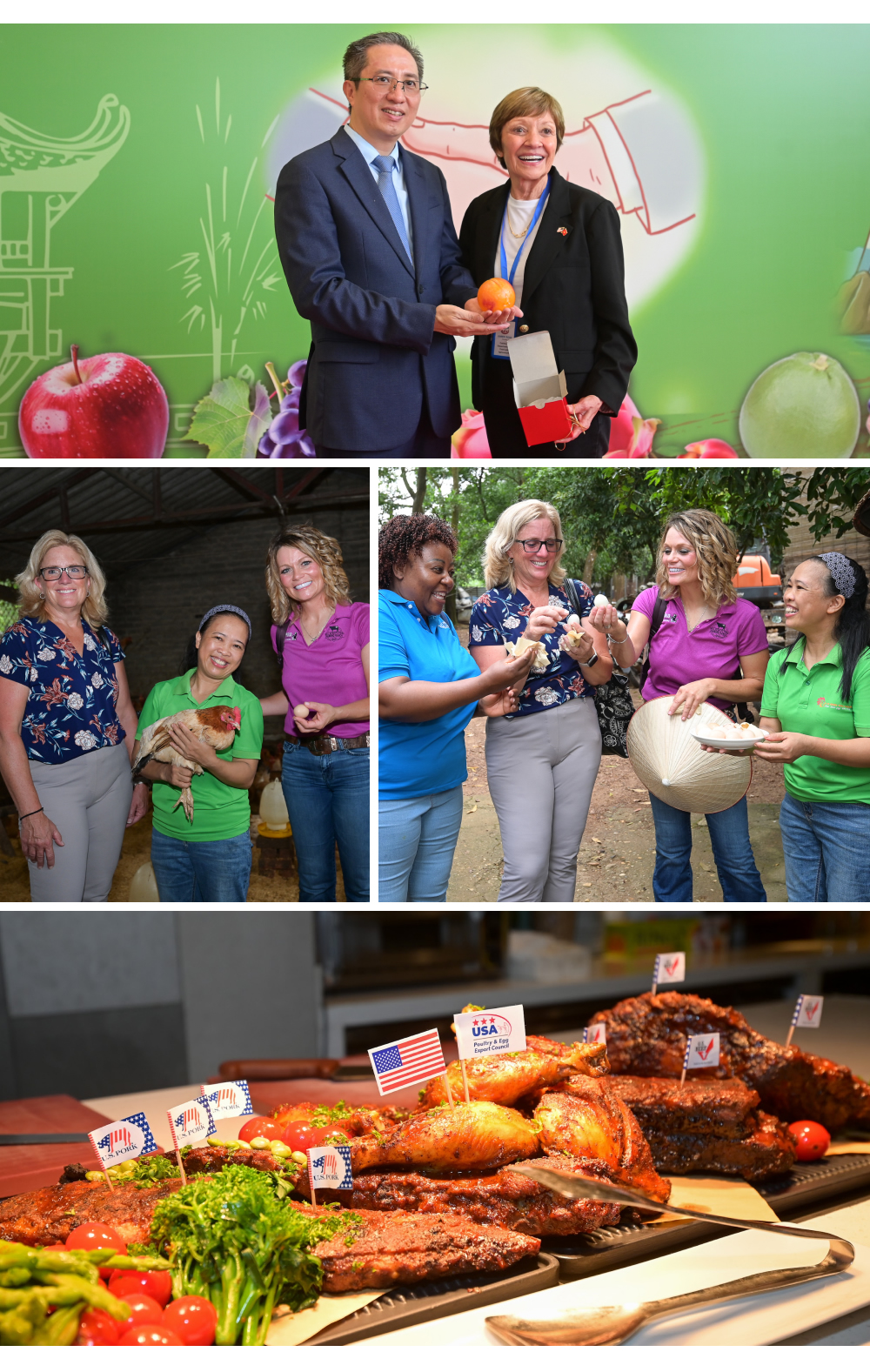
Driven by a passion for promoting Vietnamese agricultural products globally, numerous students return to Vietnam after completing their studies, taking on leadership roles in the agricultural and business sectors. Their efforts further strengthen the trade and cooperation between the two countries.
The CDFA leader views the partnership with the MARD as “planting deep seeds for the future.” She anticipates that the agriculture sectors of both nations will progress steadily, not only in trade but also in education and training.
The CDFA has frequently welcomed delegations of technical experts from the MARD to the U.S. to learn about the plant quarantine process. This exchange has enhanced mutual understanding of legal requirements, facilitating agricultural trade negotiations.
Moreover, both Vietnam and California recognize that transforming agricultural systems into smart, sustainable practices is crucial for addressing climate change. Ms. Karen Ross commended the MARD for its approach of prioritizing farmers as the driving force behind economic development.


Nebraska takes pride in being one of the premier producers of high-quality beef in the United States. The state's favorable natural conditions allow for natural grazing, free from chemical interventions. Nebraska cattle are fed corn, soybeans, and grains, resulting in tender meat with a renowned flavor that is celebrated worldwide.
During this visit, Ms. Hilary Mericle, Deputy Director of the Nebraska Department of Agriculture, highlighted the potential for introducing Nebraska beef products to Vietnam. She stated, “Beef products from Nebraska are consistently of high quality, earning the trust of consumers. Ensuring that people have adequate protein in their diets is vital for public health.”
Nebraska’s leader expressed her desire to share these quality beef products with Vietnamese consumers, aiming to provide more options for safe and nutritious food.
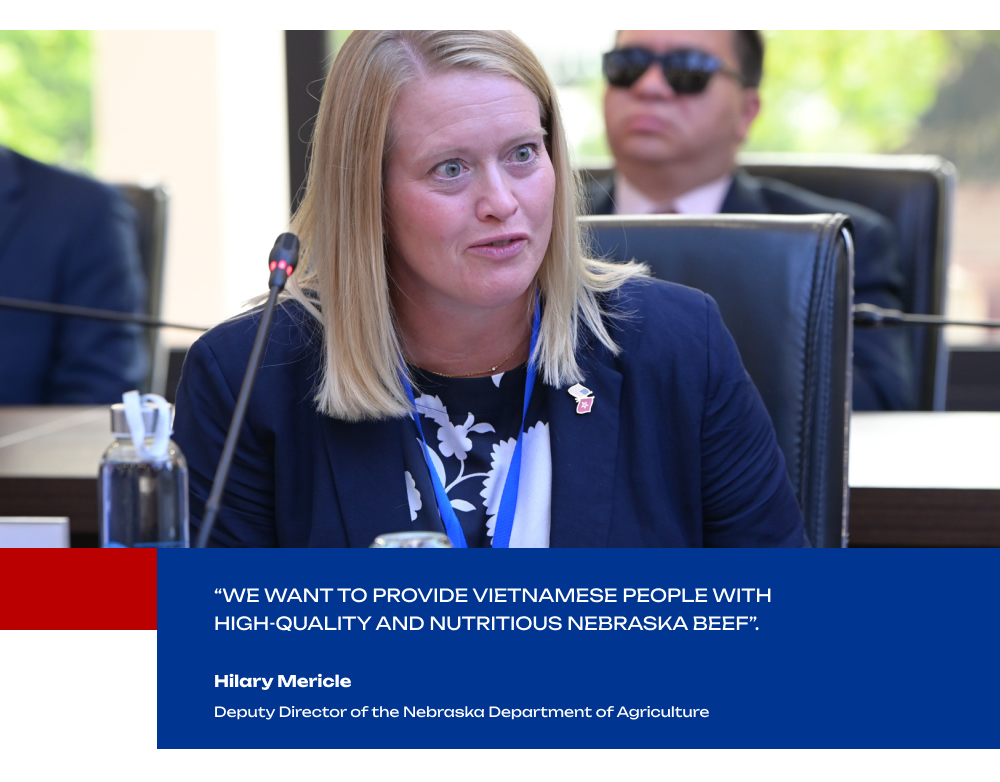

Moreover, Nebraska recognizes significant opportunities for educational cooperation between the two countries. The University of Nebraska, as a land-grant institution, has established an educational exchange program focused on smart agriculture and climate change adaptation in both crop and livestock farming.
One of the key research initiatives currently underway in Nebraska is the reduction of methane emissions from livestock through the use of feed additives and advanced scientific applications. In recent years, graduate students have been implementing circular agricultural systems to alleviate the pressures faced by traditional livestock farming.
Mericle believes that Vietnamese students coming to Nebraska will have the opportunity to learn about agricultural production and gain hands-on experience at nearby training facilities. Upon returning to Vietnam, they can apply this knowledge to various agricultural sectors, thereby contributing to the development of their homeland.
One notable advancement is the circular economy model in livestock farming. In this model, livestock waste is processed into organic fertilizer for food crops, which not only contributes to environmental protection but also enhances productivity. Nebraska has developed technology to measure the nutrient content in fertilizers, enabling farmers to determine the optimal fertilization rates for each crop cycle, thus improving production efficiency.
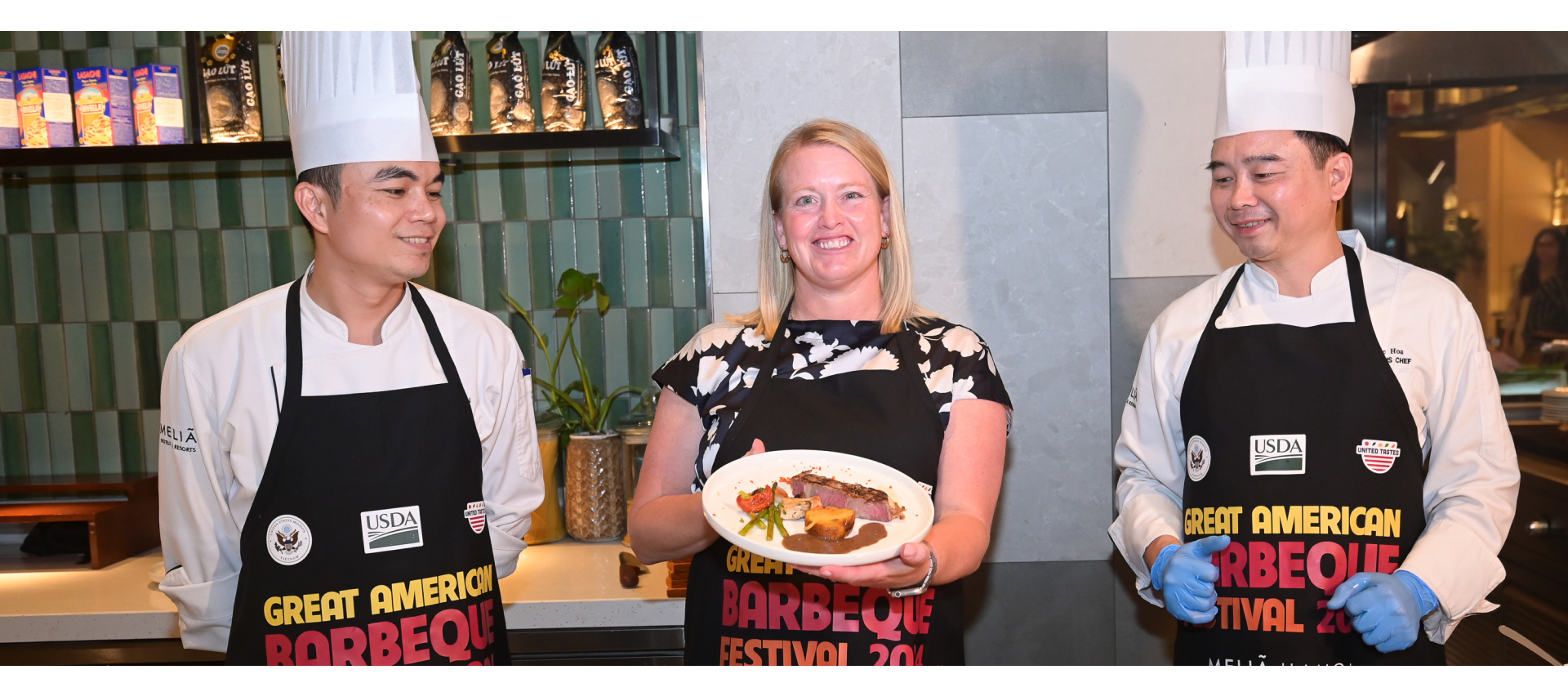
Nebraska also provides a range of solutions tailored for small-scale livestock farmers. For instance, in pork production, smallholders can easily manage soil health by rotating barns, allowing for the even distribution of phosphorus in the soil. In crop farming, instead of over-fertilizing a single area year after year, farmers can distribute fertilizer evenly across multiple plots of land, ensuring soil quality throughout the entire farm.
“The great thing about agricultural technology today is its flexibility in practical application,” Ms. Mericle emphasized. “This technology can be adapted to suit farms of all sizes, providing valuable solutions for all farmers.”


In her remarks to the press, Under Secretary Alexis Taylor underscored the significance of understanding Vietnam's market needs and fostering sustainable relationships with domestic partners.
"Vietnam is the only country I have visited twice since taking charge of foreign agricultural trade at the USDA. This reaffirms our commitment to expanding agricultural trade and establishing a long-term relationship with Vietnam," Taylor stated.
The trade mission follows the recent expansion of market access for U.S. peaches and nectarines and coincides with the first anniversary of the Vietnam - U.S. Comprehensive Strategic Partnership when both our leaders reaffirmed the importance of economic, trade, and investment cooperation and innovation- driven inclusive economic growth as the core foundations and sources of momentum in the bilateral relationship.
The Deputy Secretary of Foreign Trade and Agriculture also spoke with reporters from the Vietnam Agriculture Newspaper about the critical cooperation efforts aimed at realizing the International Year of Women Farmers in 2026. Taylor expressed her pride as a woman in the agricultural sector regarding the USDA's declaration of the International Year of the Woman Farmer. "It was an honor for me to be present at the United Nations in May 2024 and witness the enthusiastic support from Vietnam during the development and adoption of this resolution," she shared.
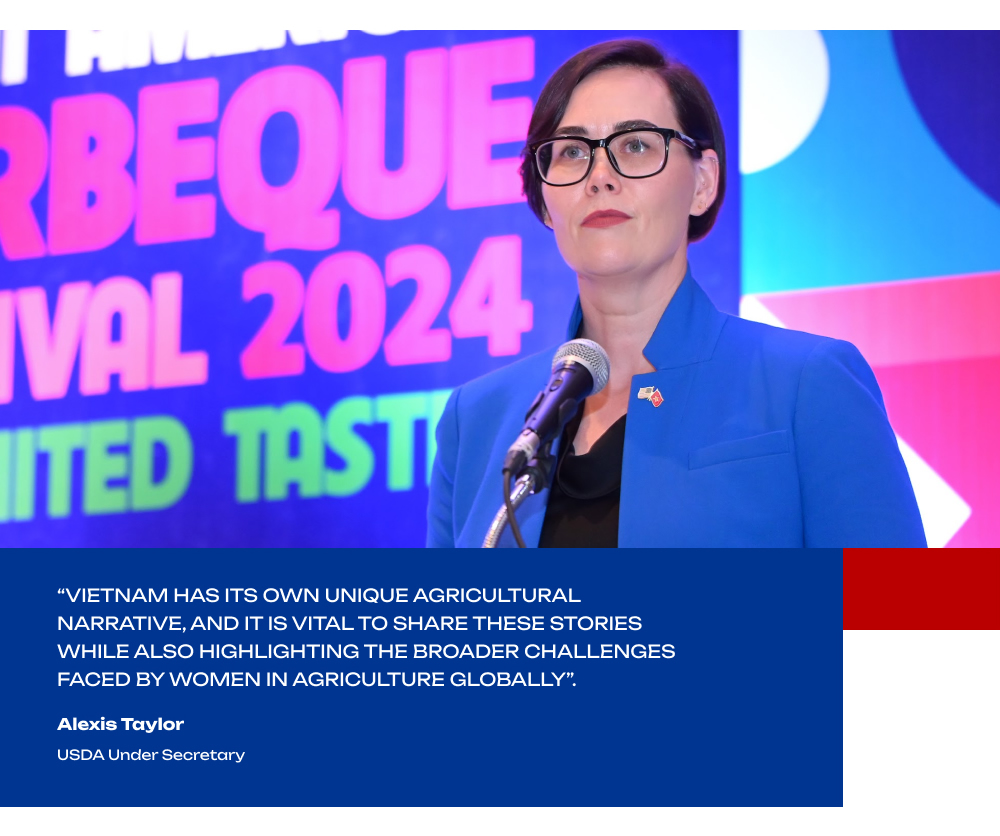
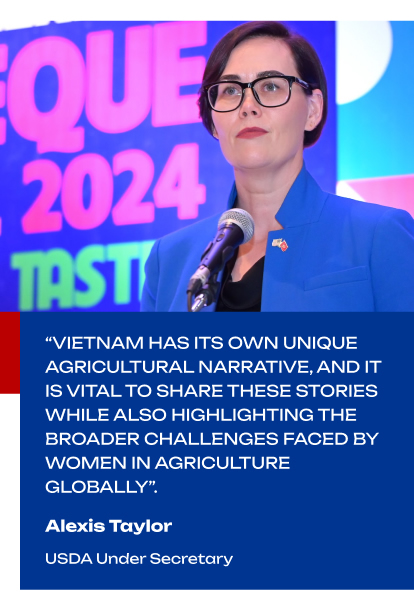
During her visit to Vietnam, the USDA leader expressed appreciation with the backing for the International Year of the Woman Farmer from the Ministry of Agriculture and Rural Development. In a bilateral meeting with the U.S. delegation, Vietnam’s Deputy Minister Phung Duc Tien commended the initiative, highlighting it as a significant step forward in promoting gender equality and enhancing the role of women in sustainable agricultural production.
USDA representatives recognize that Vietnam has a unique agricultural narrative, making the sharing of these stories crucial.
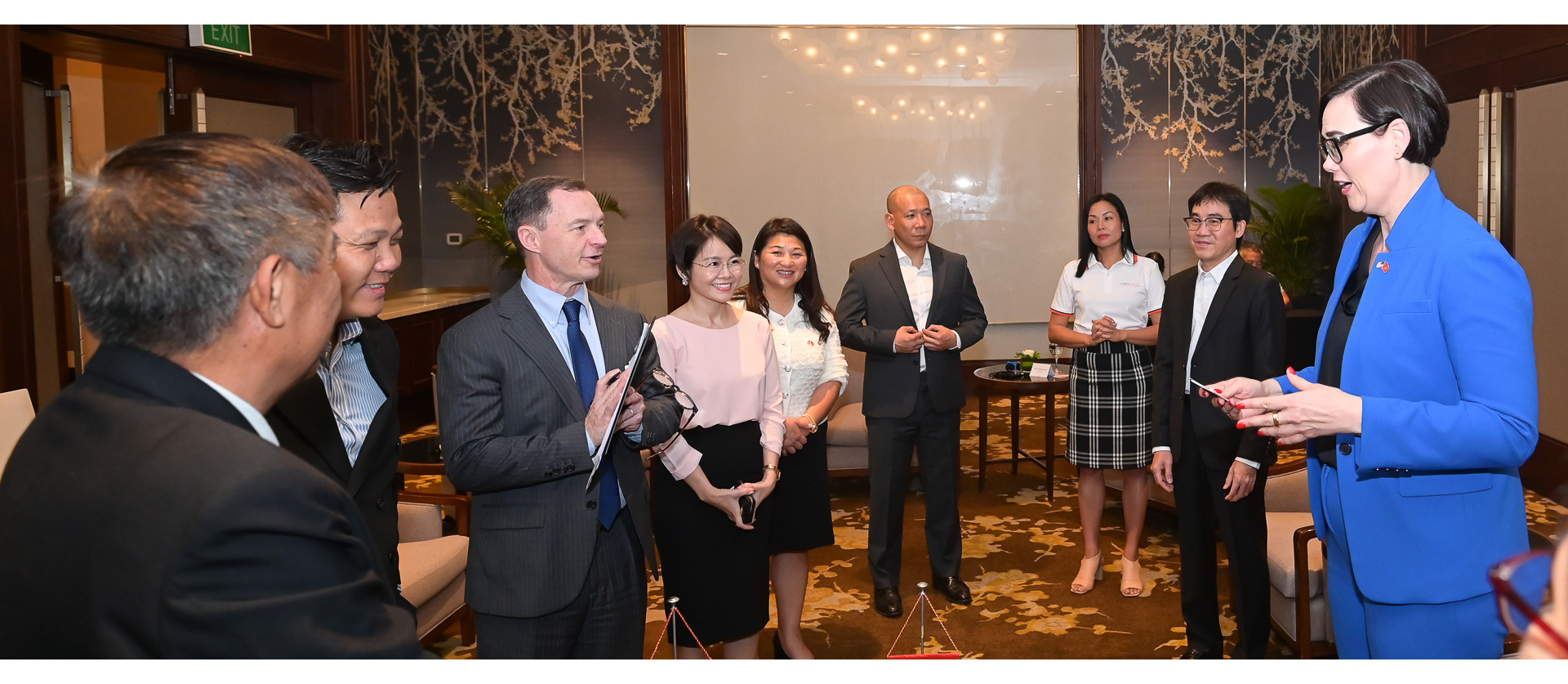
The series of events for the International Year of the Woman Farmer, held on August 12-13, 2024, selected Hanoi as its first destination, further highlighting Vietnam's commitment to raising awareness about the role of women in agriculture. The program brought two American farmers, Jennifer Schmidt and Jaclyn Wilson, to Vietnam, where they engaged with agricultural students and visited women-owned cooperatives. This experience not only deepened their understanding of the production context in Southeast Asia but also empowered the Vietnamese women farming community to continue their commitment to producing high-quality, nutritionally rich products.
The U.S. Mission to ASEAN and the United States Department of Agriculture collaborated to organize the International Year of the Woman Farmer Road Show, which facilitated the visit of these skilled farmers to Vietnam. The program aimed to motivate and enable women farmers, agricultural students, and extension workers in Vietnam, while promoting increased cooperation and educational prospects.
In Vietnam, women in agriculture still face numerous challenges, such as limited access to capital, restrictions in training and learning new technologies, and issues related to gender equality. However, these difficulties present opportunities for women to demonstrate their resilience and strength in this era of integration.
Through the International Year of the Woman Farmer initiative, the U.S. aims to develop domestic policy solutions that raise awareness of women’s roles while striving for tangible changes in the agricultural sector worldwide. According to a report by the U.N. Food and Agriculture Organization (FAO), if women had equal access to agricultural resources, the yield from women-owned farms could increase by 20 - 30%, and overall agricultural production in developing countries could rise by 2.5 - 4%.
“Improving food security and nutrition is closely linked to enhancing the livelihoods of women in agriculture, making this mission especially significant for our shared future,” Deputy Secretary Taylor emphasized, expressing hope for continued collaboration with Vietnam in joint efforts toward an equitable and beneficial agricultural landscape for all individuals and organizations involved.
